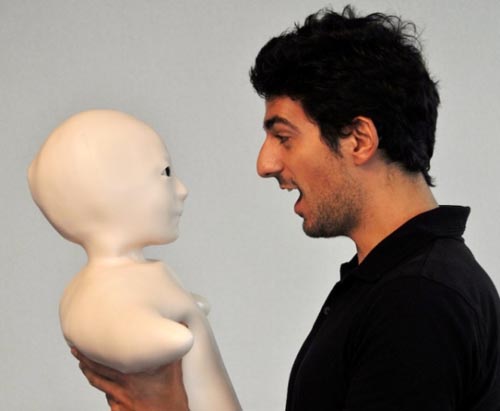Consciousness and All That Jazz
Could a robot that sings jazz be the key to understanding and harnessing robot intelligence?That is the hopes of researcher Antonio Chella at the University of Palermo, Italy.
Chella, working with Hiroshi Ishiguro Laboratory in Japan, will be training a Telenoid robot to mimic movements and simple sounds made by a human singer. The programming will include associating styles and sounds of music with certain emotional states during jazz duets with the human.
It will be seen if the robot (and the artificial intelligence programming) will be able to employ these associations to improvise as a human does, "choosing movements and vocalizations that complement its human duet partner".

Telenoid Robot
NewScientist reports Chella’s initial thoughts:
Intelligence is often defined as the ability to find connections between existing entities - understanding that a key goes in a lock, for instance. But Chella suggests that a conscious organism should be able to go a step further and introduce novel connections - between, say, musical phrases - that result in the creation of something new. That, in essence, is the idea behind improvisation.
Jazz musicians interviewed by Chella talked of having a mental library of musical phrases that they were able to combine in new ways when prompted by other musicians. Importantly, however, this combination happens in a state that is "similar in a sense to dreaming", he says. "Not really conscious, but not unconscious." Chella wants to replicate these states in a machine. "Consciousness could be linked to these moments of combination," he says.
Improvised Human Jazz Vocal Duet
This new study raises similar ideas to those examined by Surfdaddy Orca in his article "Has Emily Howell Passed the Musical Turing Test? "
Soulful Sounds from a Soulless Being: Triumph of the Cyborg Composer
Emily Howell is the daughter program of Emmy (Experiments in Musical Intelligence — sometimes spelled EMI), a music composing program written by David Cope, Dickerson Emeriti Professor at the University of California, Santa Cruz. Emily Howell’s interesting ramblings about music are actually the result of a set of computer queries.
Her music, however, is something else again: completely original and hauntingly beautiful. Even a classical purist might have trouble determining whether a human being or an AI program created it. Judge for yourself:
Orca continues:
Rather that starting with works of the classical masters, Emily Howell uses Emmy’s output to create completely original compositions. Emily Howell is adaptable and egolessly self-modifying in her ability to respond to audience criticism. (Cope’s choice of names makes it easy to anthropomorphize “her.”)
She is able to take written or audio feedback and incorporate it into her next musical composition.
Adaptability and self-modification are two attributes of intelligence. The Turing test was devised by Alan Turing as a way of authenticating machine intelligence. His well-known test involves a human judge communicating with both a computer and a human using a computer terminal. The judge must determine which is human and which is machine. The judge cannot see either the computer or the human and must make his or her determination by interviewing both. The computer attempts to convince the judge that it is human.
As Turing originally envisioned it, the computer tries to act like a human during the interview. Ray Kurzweil argues that a narrower concept of a Turing test is for a computer to successfully imitate a human within a particular domain of human intelligence, “We might call these domain-specific Turing tests,” says Kurzweil. Emily Howell falls into the category of a domain-specific Turing test, based on a computer’s ability to write entirely original music that even classical purists can’t always distinguish from human compositions.
Has Emily Howell passed the Turing Test? Put another way, can a computer become a truly creative independent agent within the narrow domain of music composition? Cope’s efforts have been praised by both musicians and computer scientists, but they disturb some. Emily Howell raises interesting questions about what it means to be human. If a machine can write a Bach invention, a Chopin mazurka, or a Mozart concerto that is indistinguishable from the original — an entirely original piece that fools even the classical aficionado — then who’s to say that Emily Howell hasn’t passed the Turing Test?
Will the ability of a robot or software to mimic human imagination mean that it is a step towards understanding consciousness? Or, as commenter Eric Kvaalen suggests in reaction to the NewScientist article, will it simply be another robotic caricature of human talent, and AI at this stage cannot do anything more than we humans program it to do?:
No matter how good this thing gets at improvising jazz, it won’t tell us anything we don’t know about consciousness. How could it? All we will know is how to make a machine that improvises jazz."
Beware, however.
The imaginations of humans is vast and unending, and in our quest to understand our own astounding and abstract consciousness, and in our yearning to recreate it through science, we may spawn something that blights us with nightmare fodder.
Between creepy, pale Telenoid torsos crooning jazz, and fleshy, rubbery, disembodied ’mouths’ chanting children’s songs about demons, we might reconsider the direction these studies are heading in.
Yikes!
Robot mouth sings "Kagome Kagome"
Singing Android Heads
By Elizabeth Leafloor, RedIceCreations.com
Sources:
NewScientist.com
HPlusMagazine.com / RedIceCreations.com
Kagome, Kagome [かごめかごめ] (Human version)






















